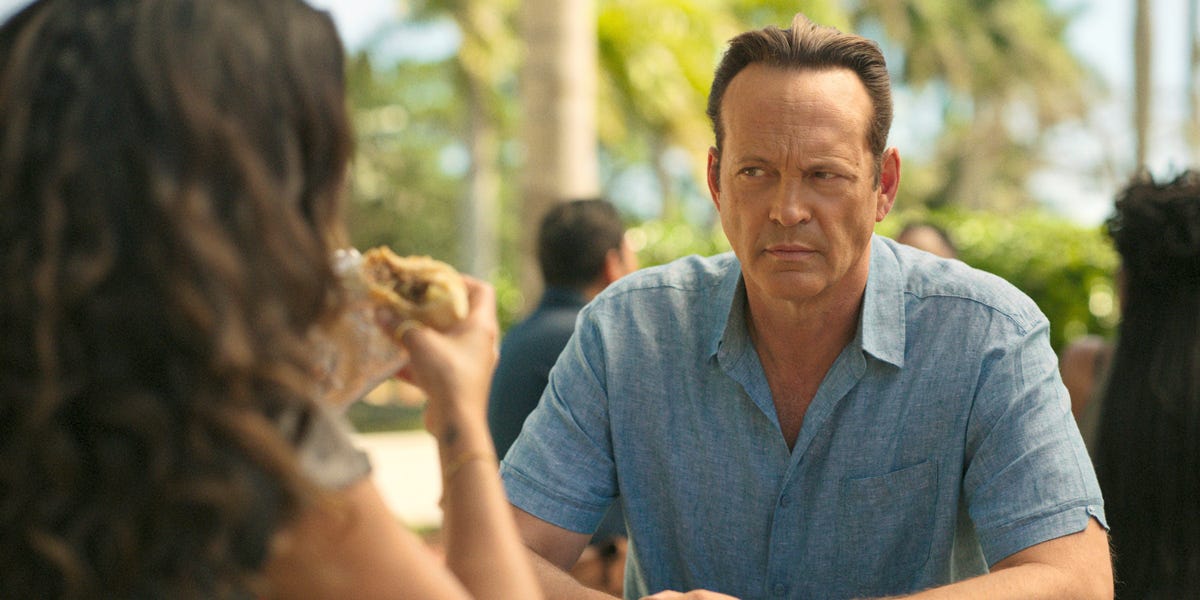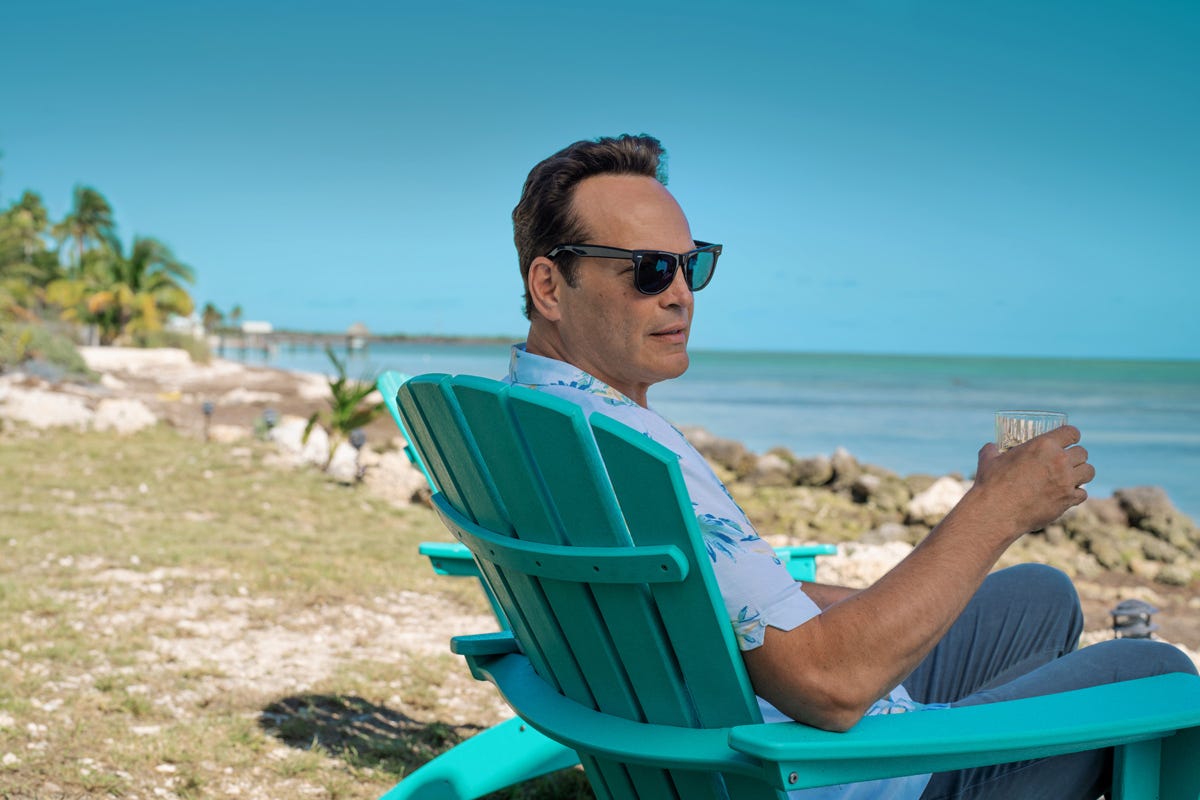Meet the new Vaughn, same as the old Vaughn
'Bad Monkey' is a perfect Vince Vaughn vehicle and a shining example of Mid-TV.
Welcome to The #Content Report, a newsletter by Vince Mancini. I’ve been writing about movies, culture, and food since I started FilmDrunk in 2007. Now I’m delivering it straight to you, with none of the autoplay videos, takeover ads, or chumboxes of the ad-ruined internet. Support my work and help me bring back the cool internet by subscribing, sharing, commenting, and keeping it real.
—
The most prominent actor to show up to the ceremonial unveiling of Vince Vaughn’s star on the Hollywood Walk of Fame last week was Mel Gibson. The Daily Mail commemorated the occasion with the headline “Mel Gibson, 68, looks unrecognizable at Vince Vaughn's Hollywood Walk of Fame ceremony,” which is maybe true if you saw Mel Gibson once in Braveheart 30 years ago and then never again, but otherwise he looked just like Mel Gibson. Anyway, my point in mentioning it is that Mel Gibson being the most notable celebrity to show up to Vince Vaughn’s walk of fame party seems to sum up Vince Vaughn’s peculiar showbiz niche these days.
Mel Gibson is notably a semi-canceled actor. Does that make Vince Vaughn also a semi-canceled actor? It’s often hard to tell when these guys are getting together to make a political point, and when they just know each other from a horse movie they did together in 1997.
A massive star on the strength of Swingers, Old School, Dodgeball and a handful of other movies people my age once wore out and now a lot of our kids do, Vaughn has lived semi off the radar for much of the 2010s and 20s, with whispers that he’s a crypto-conservative (see: hanging out with Mel Gibson) co-existing uneasily with appearances on Curb Your Enthusiasm (alongside outspoken Democratic booster Larry David). Vaughn played Freddy Funkhauser in the series, putting him in the rarified air of famous Curb regulars who don’t play themselves (Ted Danson, probably the closest 1980s analogue to Vince Vaughn, plays Ted Danson, for instance). Outside of that, Vaughn doesn’t really headline studio comedies anymore. He was in True Detective season two, but even to TDS2 defenders like me, that felt more like Vaughn Valiantly Attemping A Thing rather than successfully transcending the material the way that, say, Colin Farrell did.
Suffice it to say, this is a too-many-paragraphs long way of me trying to work through whether Vaughn being such a perfect lead in Apple TV+’s new series Bad Monkey counts as some kind of redemption arc or if it’s just Vince Vaughn doing Vince Vaughn (first person who says “Vince Vaugnaissance” gets nut punched). Did the big studio comedy abandon Vince Vaughn or did Hollywood as a whole just abandon the big studio comedy? Question for another time, perhaps.
Anyway, Bad Monkey is a new series based on the Carl Hiaasen novel of the same name, and the miniseries format seem to fit Hiaasen like a glove. Hiaasen is one of Florida’s most famous novelists, the lighthearted pulp answer to Harry Crews’ Florida noir, meets Elmore Leonard with a Borscht Belt sensibility. Yet it’s actually a different best-selling contemporary fiction author who gets his name dropped the most in Bad Monkey. That would be Richard Russo, the non-Floridian best known for his trilogy Nobody’s Fool, Straight Man, and Empire Falls, the last of which won the Pulitzer.
It makes sense for Bad Monkey to name drop Russo, since at his best, Vaughn’s Andrew Yancy feels exactly like if you turned Straight Man’s Hank Devereaux, the insouciant bad boy of the West Central Pennsylvania University English Department, into a police detective banished to the Florida Keys for constantly pissing off his bosses. Both characters are inveterate bullshitters (the mostly harmless kind), with healthy disdains for rules, and hearts of gold. Devereaux threatens to kill a campus goose every day until a departmental budget is approved; Yancy pushes his girlfriend’s husband’s golf cart off a dock with him in it after the husband gives her a black eye.
They’re both the kinds of guys that sticklers and doctrinaire types love to hate, who romantics and philandering alcoholics love to love. Real McNulty types, say — protagonists who could easily form the basis for countless cultural studies theses on the subject of white privilege. Bad Monkey is Richard Russo meets Elmore Leonard.
Bad Monkey’s woolly plot sees Yancy get caught up in a murder-for-hire scheme involving Eve Stripling (Meredith Hagner), a rich widow Yancy thinks helped kill her Medicare fraudster husband, whose severed hairy arm with middle finger raised has washed up in the Florida Keys, where Yancy leads his comfortable life of petty indignities. Rob Delaney shows up as Meredith’s boyfriend, Christopher. The great John Ortiz plays Yancy’s straight man, his gay ex-partner (on the police force), Rogelio. Natalie Martinez takes love interest duty, as Miami medical examiner Rosa Campesino, with all sorts of other characters thrown in there as well, from Bahamian Yancy analog Neville, who owns the titular monkey (Ronald Peet, Crystal the Monkey), to crazy ex Bonnie Witt (Michelle Monaghan, who doesn’t seem to have aged a day since Kiss Kiss Bang Bang), to an intimidating voodoo lady known as “The Dragon Queen” (Jodie Turner-Smith). Wizened “That Guy” Scott Glenn gets a great turn as Yancy’s blissed out new agey dad, who once learned a valuable life lesson from a manatee.
What do I say in every review? Great stories are about people and place. Bad Monkey, as is standard in Hiaasen stories, leans hard into being a story that could only take place in South Florida. Medicare cheats, scummy house flippers, lecherous lady teachers desperate for adventure — Bad Monkey is a classic “sunny place for shady people” story (with due respect to Billy Corben for coining that phrase about his home state). The soundtrack needle drops Gainesville’s favorite son Tom Petty at least once an episode. Only they’re Tom Petty covers, which I’m sure is a deliberate artistic choice but also gives me Tom Petty blueballs. No Tom Petty methadone for me, please, I need the real thing.
Vaughn mostly smirks and wisecracks his way through the proceedings, like a stretched out Bill Murray with a medium-believable dye job (that I could’ve done without). Largely it’s the kind of frequently-used format that’s usually annoying, but there’s a reason Vaughn made a career playing this kind of character. He’s perfect for it. The French famously have a phrase that translates to “staircase wit,” named for the phenomenon whereby you finally think of that perfect quip or comment long after the moment has passed, while you’re standing outside next to the staircase on the way out of someone’s apartment. There are many novels and shows that, like Bad Monkey, consist largely of Life-As-Extended-Staircase Wit, with witty (usually white male) protagonists as stand-ins for the author, who get into hijinks, feud with bureaucratic shitheads, bed beautiful women, and always deploy just the right quip at just the right moment (the jerk store called!!!). What if there was a really cool person who was kinda like me only funnier and more interesting? is probably the oldest genre in fiction.
We could, again, easily play Dime Store Psychologist here, for the purposes of Cultural Studies paper or whatever. But suffice it to say, lots of creators love this format, and it tends to work best when 1. the quips are actually witty, and 2. the lead can make other people’s reactions to him (or her, but usually him) feel believable. Bad Monkey mostly succeeds on both counts. This thanks to Vaughn, Hiaasen, and show creator Bill Lawrence, the rare showrunner to include a ton of voiceover, and have it actually feel necessary. Lawrence understands that this format works so well in novels because it’s driven partly by entertaining commentary and observations about the setting, which the frequent narration allows the TV series to do too. Whatever else you say about Bad Monkey, it feels exactly like reading a Carl Hiaasen novel.
Lawrence previously served as showrunner on Scrubs, Shrinking, and Ted Lasso, and to a large part, I imagine one’s enjoyment of Bad Monkey comes down to whether it strikes one more as an accurate Carl Hiaasen adaptation or a twist on the Ted Lasso format. Ted Lasso got progressively worse the more Ted Lasso as a character was intended to be legitimately clever and inspiring (puke). I enjoyed it early on, when I thought he was just supposed to be an eccentric Midwestern football guy who annoyed everyone, in a show that was otherwise largely about living an embittered English soccer town. Andrew Yancy, so far as I can tell, isn’t intended to be a Halloween costume, just kind of a lovable prick who’s good with a quip. And so far, Bad Monkey is easily my favorite of Bill Lawrence’s shows.
Certainly, a Hank Devereaux/Andrew Yancy character is easier to believe as an English professor going through a mid-life crisis than as a police detective who occasionally gets into shootouts with dirty cops and fist fights with Russian gangsters, as Yancy does. Bad Monkey obviously lives on a different plane of believability than a Richard Russo or Elmore Leonard novel. I can accept it, but I don’t always buy it.
I would never call Bad Monkey “Copaganda.” Like The Wire, it’s much more a story about how bosses are assholes, using the mostly-fictional Cool Witty Cop as a creative conceit, a necessary stand-in for us. Yet it’s admittedly weird to watch the blasé, wisecracking protagonist kill people. Blasé killing kind of cuts against the whole “heart of gold” thing. Vaughn can do a lot of work with a facial expression alone, but they probably could’ve written fewer fist fights and shootouts (Vince Vaughn is comically terrible at running for some reason).
The plot frequently pushes Bad Monkey past the limits of believability, while the Characters as Witty Observation Delivery Systems can also go too far and have the whole thing come off a little smug (see: Sorkin, Aaron). But that self-satisfaction peaks in episode three and is mostly tolerable after that. It’s a clever show that’s just entertaining enough, while existing as a ball-busting love letter to place where it’s set. It’s an easy breeze, the way it seems intended.
There’s been a lot of great TV in the past 10 or 20 years, certainly with shows more memorable and artistically relevant than this one. But it’s hard to think of another one that feels like it could’ve aired on primetime in the nineties and been appointment viewing for the whole family.







"First person who says “Vince Vaugnaissance” gets nut punched"
All right boys, pack your bags and ball up them fists, we're going on a Nut-Punch Pilgrimage to Fresno.
Reading your and Brian Grubb's respective takes on this show is a testament to two very different voices, which I mean as a compliment to both of you.